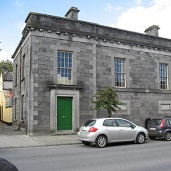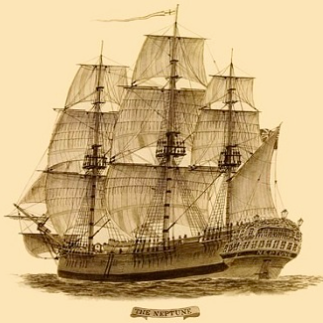Throughout the years of the Great Famine, hunger, disease, and the Workhouse were not the only threats faced by the people of Ireland. There was also rampant crime, as desperate people were forced to beg, borrow, and steal what they could in order to survive. These minor offences often resulted in a sentence of Penal Transportation.

The sentence of Penal Transportation was carried out in Ireland from 1791 to 1853. This form of punishment involved the removal of convicted criminals from the land of their birth and relocating them elsewhere, most commonly to Australia. Many people in Australia who have a claim to Irish ancestry can trace their roots back to a person who was sent to a far away land as punishment for their crimes. These infractions vary in severity from armed robbery to the theft of barely enough bread to survive the day. Penal Transportation was put in place as a way of punishing minor crimes without having to resort to the barbarism of capital punishment, as the public feeling towards hanging became increasingly negative.
Yet a sentence of Penal Transportation did not necessarily mean that you would never see your family again. Female convicts were often permitted to bring their children with them. The wives and families of male convicts could also petition to follow them as free immigrants to Australia. Children themselves were also subject to the threat of Penal Transportation as the records show that the sentence was given to children as young as 12 years old. At a time when the country was struggling to feed its population, and the Union Workhouses were far beyond maximum capacity, it is hardly surprising that the magistrates took the opportunity to send as many hungry mouths away as possible.
Kitty McHugo
Kitty McHugo from East County Galway was tried at Portumna Court on the 27th of December 1848. She and her two brothers, as well as another woman, were convicted of theft, having stolen two sheep from a local farmer. Kitty and her associates were sentenced to Penal Transportation. She was sent to Hobart in Tasmania, where a number of “female factories” existed. These were manufacturing sites where specifically women were put to work, often making textiles or other such gendered roles. Once women had served their sentences, they were eligible to be hired for paid work, and so with the cost of a return journey, and the lack of opportunity in Ireland, it is unlikely that Kitty, or those like her, would have made the voyage home.
Michael Seery
Michael Seery of Castletowndelvin, County Westmeath, was convicted of armed burglary on the 10th of March 1832. He was sentenced to Penal Transportation and left for New South Wales on board a ship called the Roslin Castle on the 8th of October of that same year. His wife, Bridget, applied to the courts to join her husband, along with their young daughter Winifred. Her request was granted and the pair arrived in Australia two and a half years after Michael left. The family then settled in New South Wales. They went on to have a further seven children, including a set of twins. Micheal received his ticket of leave which would have allowed him to work for himself, but a re-offence meant that the ticket was cancelled. In 1849 he received a Conditional Pardon, which meant that his life sentence was removed, but he was not permitted to return to Britain or Ireland. He purchased 30 acres of land and died a respected member of the community.
The Blockade of The Neptune
The people of Australia were becoming increasingly disgruntled with the continued use of their new country as a penal colony. Yet when attempts were made at alternative routes, there was often a serious backlash, as in the case of The Neptune.
In 1849, a ship called The Neptune set sail for South Africa. The ship carried almost 300 prisoners. It was intended that they be put to work on a number of essential construction projects in Cape Town. However, the locals had other ideas. Not wanting to become another penal colony like New South Wales, they protested the arrival of the prisoners, and even went so far as to blockade the ship that carried them so that it could not enter the harbour. Not only were they keeping the prisoners at bay, many of whom, it bears mentioning, would have been on board the ship for very minor crimes, but they were also denying the 55 crew members access to adequate supplies and fresh water. The blockade went on for five long months during which time the people on board the ship received little sympathy or aid from the people of Cape Town. One man who did try to help them was Mayo native Robert Stanford who sent supplies to the ship, but his charitable nature was met with disdain in the community and his entire family was shunned, though Queen Victoria commended his kindness and granted him a knighthood.
The crew of The Neptune eventually realised that the people of Cape Town were not going to relent. So they changed course for Tasmania where the prisoners were put to work and carried out their sentences.
Journey’s End
As the population of free immigrants in Australia grew, so too did a distaste for the use of the country as a Penal colony, and it was due to the protestations of these locals that Penal Transportation was largely stopped in 1853, with a few exceptions in later years such as the sentencing of those involved in Fenian activities. The sharp rise in popularity of Penal Transportation had served its purpose by easing the burden on the Poor Law Unions and removing many families from a country that was struggling to keep its children fed. By the time that Penal Transportation was halted, entire communities had been established in Australia by the families and descendants of convicts. Many of these strong Irish communities still exist in Australia today, and it is with open arms that we welcome the descendants of the transported to their ancestral home to commemorate our shared history.
Click on the images to learn more about the entries that inspired this Chronicles Insight.
Catherine McHugo 1826
Portumna Courthouse
Michael Seery 1808
The Blockade of the Neptune
Robert Stanford 1806
We hope you have found the information we have shared helpful. While you are here, we have a small favour to ask. Ireland Reaching Out is a non-profit organisation that relies on public funding and donations to ensure a completely free family history advisory service to anyone of Irish heritage who needs help connecting with their Irish place of origin. If you would like to support our mission, please click on the donate button and make a contribution. Any amount, big or small, is appreciated and makes a difference.




